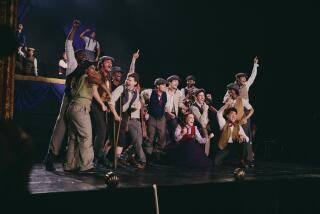Ask an official, post the answer, get paid
- Share via
CHICAGO — Why do we vote on Tuesdays?
A bipartisan voter-reform group is paying prospective voters to videotape themselves asking elected officials that question face to face.
The first person to post a clip of a particular official onto YouTube or another video-sharing website cashes in.
The bounty hunting is lucrative: For a current U.S. House member, the payoff is $300, while a sitting U.S. senator or governor is worth $500. A vice president, either sitting or not, brings $2,500; President Bush or a predecessor commands $5,000.
The contest is being sponsored by “Why Tuesday?”, chaired by former U.N. Ambassador and Atlanta Mayor Andrew Young, and financed by its founder, New York attorney William Wachtel.
The group thinks voter turnout would improve if election day were on the weekend, instead of the Tuesday after the first Monday in November.
The result so far has been an amusing cross between civics lesson and campaign trail “gotcha.”
“You know, I don’t know,” confessed Sen. Russell D. Feingold (D-Wis.), when confronted with the question last week by Jacob Soboroff, a recent New York University graduate, at a retirement center in Milwaukee.
Wachtel said the idea came about when he and other group members saw voters flocking to YouTube to study the latest political ads and off-the-cuff campaign quips.
What better way to get the candidates talking about an issue, said Wachtel, than to get voters asking about it themselves? And what better lure than cash to entice the public?
Some say people shouldn’t be paid to ask political leaders a question. “It seems like a well-meaning but misguided crusade,” says Curtis Gans, director of the Washington-based Committee for the Study of the American Electorate. Besides, he says, experiments with weekend elections have shown that turnout actually suffers.
Wachtel figures to cough up more than $200,000 if every qualified politician is caught between now and Jan. 31, when the contest ends.
“We’re just trying to have some fun and get people talking about voter reform,” he said.
The contest began last week. So far, the only postings are by Soboroff and a former college roommate, who say they have earned $2,800 for interviews with four senators, one governor and a House member. They say they are not in league with the contest promoters.
“A friend of ours had heard about it on the Web, and we thought it’d be an interesting way to pay for a road trip and be part of the election,” said Soboroff, 23, of Pacific Palisades, whose traveling partner is Barnett Zitron, 24, of New York City.
Armed with a laptop, a wireless card, a digital video camera and a car full of snacks, the two search the Web for upcoming public appearances of political candidates. Then they crash the events with their one question.
Tracked down at a biodiesel gas station in Indiana, Sen. Richard G. Lugar (R-Ind.) said he liked the idea of making election day a national holiday, but was unclear about the Tuesday tradition. “I don’t know,” Lugar said.
It turns out, Soboroff tells Lugar on the video, the practice dates to 1845 when Congress tried to select a convenient time for voters living in the mostly rural society.
By November, harvest was usually over but harsh weather hadn’t set in. Saturdays were a workday for farmers, and Sunday was for church. And Wednesday was market day in most towns. Considering it might take a full day to travel by horse to a polling station, Tuesday in early November became the choice.
“Thank you for the piece of education,” Lugar said to Soboroff with a grin.
*
More to Read
Get the L.A. Times Politics newsletter
Deeply reported insights into legislation, politics and policy from Sacramento, Washington and beyond. In your inbox twice per week.
You may occasionally receive promotional content from the Los Angeles Times.










